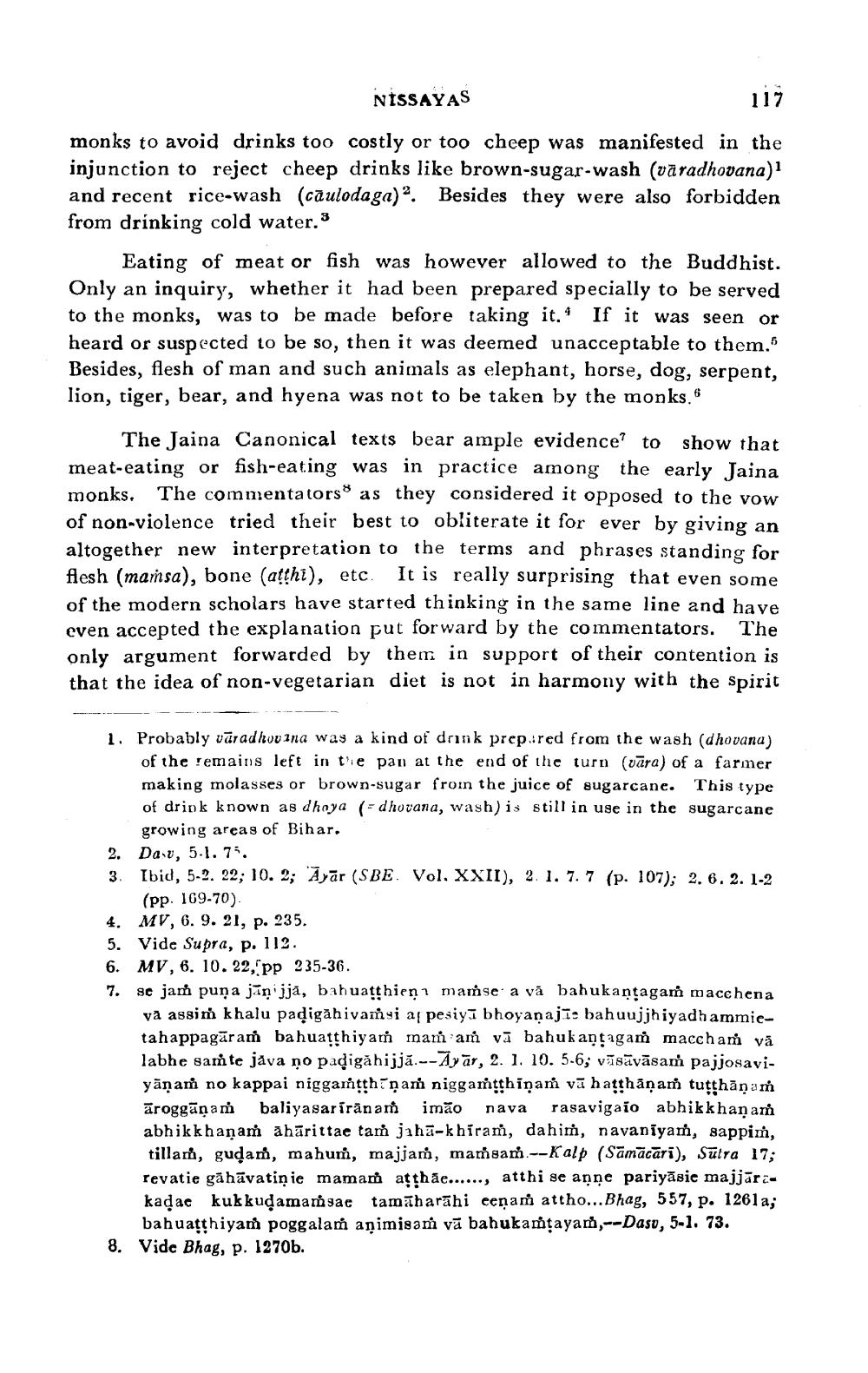________________
NISSAYAS
117
monks to avoid drinks too costly or too cheep was manifested in the injunction to reject cheep drinks like brown-sugar-wash (varadhovana)1 and recent rice-wash (caulodaga)". Besides they were also forbidden from drinking cold water.
Eating of meat or fish was however allowed to the Buddhist. Only an inquiry, whether it had been prepared specially to be served to the monks, was to be made before taking it. If it was seen or heard or suspected to be so, then it was deemed unacceptable to them." Besides, flesh of man and such animals as elephant, horse, dog, serpent, lion, tiger, bear, and hyena was not to be taken by the monks."
The Jaina Canonical texts bear ample evidence' to show that meat-eating or fish-eating was in practice among the early Jaina. monks. The commentators as they considered it opposed to the vow of non-violence tried their best to obliterate it for ever by giving an altogether new interpretation to the terms and phrases standing for flesh (mamsa), bone (atthi), etc. It is really surprising that even some of the modern scholars have started thinking in the same line and have even accepted the explanation put forward by the commentators. The only argument forwarded by them in support of their contention is that the idea of non-vegetarian diet is not in harmony with the spirit
1. Probably varadhovina was a kind of drink prepared from the wash (dhovana) of the remains left in the pan at the end of the turn (vara) of a farmer making molasses or brown-sugar from the juice of sugarcane.
This type
of drink known as dhoya (dhovana, wash) is still in use in the sugarcane growing areas of Bihar.
2. Dav, 5.1. 75.
3. Ibid, 5-2. 22; 10. 2; Ayar (SBE. Vol. XXII), 2. 1. 7. 7 (p. 107); 2. 6. 2. 1-2 (pp. 169-70).
4. MV, 6. 9. 21, p. 235.
5. Vide Supra, p. 112.
6. MV, 6. 10.22, pp 235-36.
7.
se jam puņa jāņijjā, bahuaṭṭhien mamse a va bahukanṭagam macchena va assim khalu padigahivamsi af pesiya bhoyanaji bahuujjhiyadhammietahappagaram bahuatthiyam mam am va bahukanṭagam maccham vā labhe samte jāva no paḍigāhijjā.--Дyār, 2. 1. 10. 5-6; vāsāvāsaṁ pajjosaviyāņam no kappai niggamṭthnam niggaṁtthiņam vā haṭṭhāṇam tuṭṭhānam äroggaṇam baliyasariranam imão nava rasavigaïo abhikkhanam abhikkhanam ahärittae tam jaha-khiram, dahim, navaniyam, sappim, tillam, guḍam, mahum, majjam, mamsam--Kalp (Samācārī), Sūtra 17; revatie gähāvatiņie mamam atthae......, atthi se anne pariyasie majjarakadae kukkuḍamamsae tamaharahi eenam attho... Bhag, 557, p. 1261a; bahuatthiyam poggalam animisam va bahukamṭayam,--Dasu, 5-1. 73. 8. Vide Bhag, p. 1270b.




